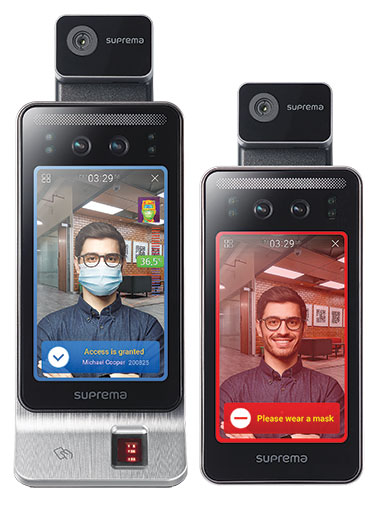

When the COVID-19 pandemic hit severe levels in February 2020, the South Korean government’s Centres for Disease Control and Prevention asked that businesses and organisations across the country implement new measures to help prevent the spread of the disease. The use of thermal cameras to automatically detect external skin temperature and the presence of a fever was quickly embraced as a pragmatic and highly effective solution.
Hyundai was amongst the first companies to implement thermal technology at the construction site of the company’s Dongtan Silicon Alley facility located in the Dongtan Techno Valley – one of the largest industrial complexes in the country.
Suprema’s FaceStation 2, combined with thermal cameras, was deployed at the massive construction site for employee time and attendance and temperature readings. The multi-function solution also provides automatic face mask detection to alert them when an individual is not wearing a mask in mandated areas. The ability to simultaneously deliver facial recognition identification along with temperature and mask detection proved to be a highly effective and cost-efficient solution to maintain construction.
The South Korean government also launched several other initiatives to track outbreaks and help prevent the spread of the COVID-19 virus. In June, the government implemented a new quick response (QR) code system for contact tracing. The new system required visitors to nightclubs, bars, karaoke clubs, daytime discos, indoor gyms, and indoor concert halls to use any of several commercially available apps to generate a one-time, personalised QR code to be scanned when entering a facility.
Local governments also designated other high-risk facilities such as libraries, hospitals, restaurants and/or churches in the list of locations for contact tracing. According to South Korea’s Ministry of Health and Welfare, an individual’s information is logged into a database maintained by the Social Security Information Service for four weeks, before being automatically deleted. This contact tracing system helped the South Korean government to quickly detect and isolate COVID-19 outbreaks as a means of containment.
South Korea also deployed hundreds of walk-in COVID-19 testing booths across the country, making testing fast and easy. The COVID-19 testing booths resemble motor homes from the outside, but inside contains a bank of four booths with transparent plastic walls and embedded rubber gloves in a manner similar to a high-tech biosafety lab. When a person walks into a booth, they consult with a doctor over an intercom. The doctor remains outside the booth and can swab their nose and throat using the gloves without ever coming into contact with the patient. For added safety, the booths maintain negative air pressure, which filters out any airborne virus-carrying droplets. After each test is conducted, a staff member in protective gear disinfects the booth, scrubbing the walls with a squeegee.
The nation of 51 million people has also taken a big data approach to contact tracing, using credit card history and location data from cellphone carriers to retrace the movements of infected people. Surveys show most citizens agree with sacrificing digital privacy to stop the outbreak. At the same time, authorities have pushed an intense – but mostly voluntary – social distancing campaign, leaving most bars, restaurants, and movie theatres free to operate.
A major factor shaping South Korea’s response was its ability to apply lessons learned during previous outbreaks, especially the country’s MERS coronavirus outbreak in 2015, which resulted in 186 cases and 38 deaths.
The four key lessons to be learned from South Korea’s successful battle against COVID-19 include:
1. Intervene quickly to prevent a crisis.
2. Test early, often and safely.
3. Implement contact tracing, isolation and surveillance.
4. Enlist the public’s help and cooperation in implementing mandates.
5. Implement the most effective and easily deployed technologies at your disposal.
South Korea was hit with a second wave of COVID infections in mid-August, but has managed the outbreak successfully with the measures mentioned in this article.
| Tel: | +27 11 784 3952 |
| Email: | [email protected] |
| www: | www.suprema.co.za |
| Articles: | More information and articles about Suprema |

© Technews Publishing (Pty) Ltd. | All Rights Reserved.